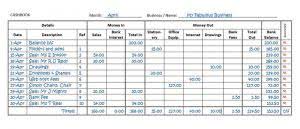
Hence, accounting records are made only after the goods have been physically received. As a case in point, the devaluation of the US dollar may have no financial implication for a small trader who has no import or export dealings. If a transaction or an event does not have a financial implication, it will not be recorded in the accounting books. A transaction is any business dealing or activity in which a business unit (or a person) is involved that causes a change in its financial position (e.g., purchase or sale of goods). The difference between these two accounting methods is the treatment of accruals. Larger companies often have much more complex solutions to integrate with their specific reporting needs.
Analysis of Financial Statements
- Certain high-volume transactions, such as customer billings, may be stored in a subledger, with only its totals rolling into the general ledger.
- It is important that these records must be made in a significant (i.e., organized and methodical) manner in order to be of any real use to a business unit.
- Individuals, sole traders, Partnerships, companies, corporations—all cannot survive without keeping proper accounts.
- Our writing and editorial staff are a team of experts holding advanced financial designations and have written for most major financial media publications.
- When the client pays the invoice, the accountant credits accounts receivables and debits cash.
Our team of reviewers are established professionals with decades of experience in areas of personal finance and hold many advanced degrees and certifications. The articles and research support materials available on this site are educational and are not intended to be investment or tax advice. All such information is provided solely for convenience purposes only and all users thereof should be guided accordingly.
- For information pertaining to the registration status of 11 Financial, please contact the state securities regulators for those states in which 11 Financial maintains a registration filing.
- You can outsource your accounting work to outside professionals who specialize in bookkeeping and tax preparation.
- Larger companies often have much more complex solutions to integrate with their specific reporting needs.
- This can be a great option if you want to ensure your books are in order, and that your company’s financial information is accurate, but it does come with some drawbacks.
- Accountants help businesses maintain accurate and timely records of their finances.
- Many accounting practices have been simplified with the help of accounting computer-based software.
- These four largest accounting firms (Ernst & Young, KPMG, PricewaterhouseCoopers, Deloitte) conduct audit, consulting, tax advisory, and other services.
What is the difference between a hobby and a business?
The results of the efforts of the preceding accountants are accumulated into a set of accounting records, of which the summary document is the general ledger. The general ledger consists of a number of accounts, each of which stores information about a particular type of transaction, such as product sales, depreciation expense, accounts receivable, debt, and so on. Certain high-volume transactions, such as customer billings, may be stored in a subledger, with only its totals rolling into the general ledger. The ending balances in the general ledger may be altered with adjusting entries each month, mostly to record expenses incurred but not yet recorded. The expenses incurred to run a business and the income earned is recorded in accounting.

Organization
For information pertaining to the registration status of 11 Financial, please contact the state securities regulators for those states in which 11 Financial maintains a registration filing. It also shows the company’s financial position (in terms of assets, liabilities, and proprietor’s interest) at the end of the period. While additional or subsidiary records may be kept by some businesses in terms of quantity, the basic accounting records are all kept in terms of money. The preparation of such summarized financial statements is frequently the ultimate aim of keeping records and classifying them. After the basic records have been suitably classified into groups, the information provided by the groups is summarized into accounting statements (e.g., statements showing the calculation of profit and loss or the business’s financial position). Accounting is the art of recording, classifying, and summarizing transactions and events.
- An event, on the other hand, is an occurrence to which a business unit may not be a direct party, but may still be affected by it.
- Consistency refers to the ability to make relevant comparisons within the same company over a period of time.
- An asset increases the wealth of a person, firm, or country whereas an expense reduces it.
- Financial accounting refers to the processes used to generate interim and annual financial statements.
- Hence, accounting records are made only after the goods have been physically received.
- The company should manage its economic resources, carry out business exclusively in accordance with its stated objectives, and keep its management, owners, and staff transactions separate.
Cash Flow Statement

Financial statements include the income statement, balance sheet, and statement of cash flows. Analysts, managers, business owners, and accountants use this information to determine what their products should cost. In cost accounting, bookkeeping and payroll services money is cast as an economic factor in production, whereas in financial accounting, money is considered to be a measure of a company’s economic performance.

Just as managerial accounting helps businesses make management decisions, cost accounting helps businesses make decisions about costing. Essentially, cost recording transactions accounting considers all of the costs related to producing a product. Accounting is the process of recording, classifying and summarizing financial transactions. It provides a clear picture of the financial health of your organization and its performance, which can serve as a catalyst for resource management and strategic growth. Accountancy is the practice of recording, classifying, and reporting on business transactions for a business.

Suppose ABC Ltd., a household items manufacturing company, wanted to explore new areas of business and launched a new range of cosmetics in a new geographical location. Since this is a new venture in a new location, the company wanted to test the waters by establishing a separate company applying the accounting entity concept. This way, the newly formed company functions separately to work toward what is accountancy cosmetic production. Through this method, ABC separated the risk of business collapse from its existing self. Also known as social accounting or sustainability accounting, it is the process of disseminating the social and environmental impact of the economic activities undertaken by the organization. Accountancy explains – for what reason and in what way, the firm’s books of accounts are prepared, as well as the manner in which accounting information is summarized and communicated to its users.




